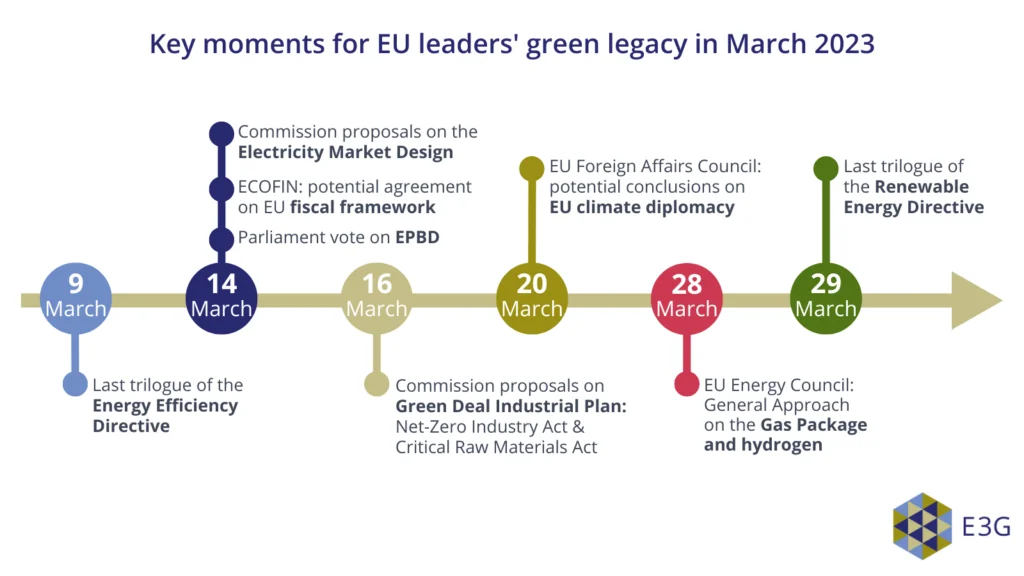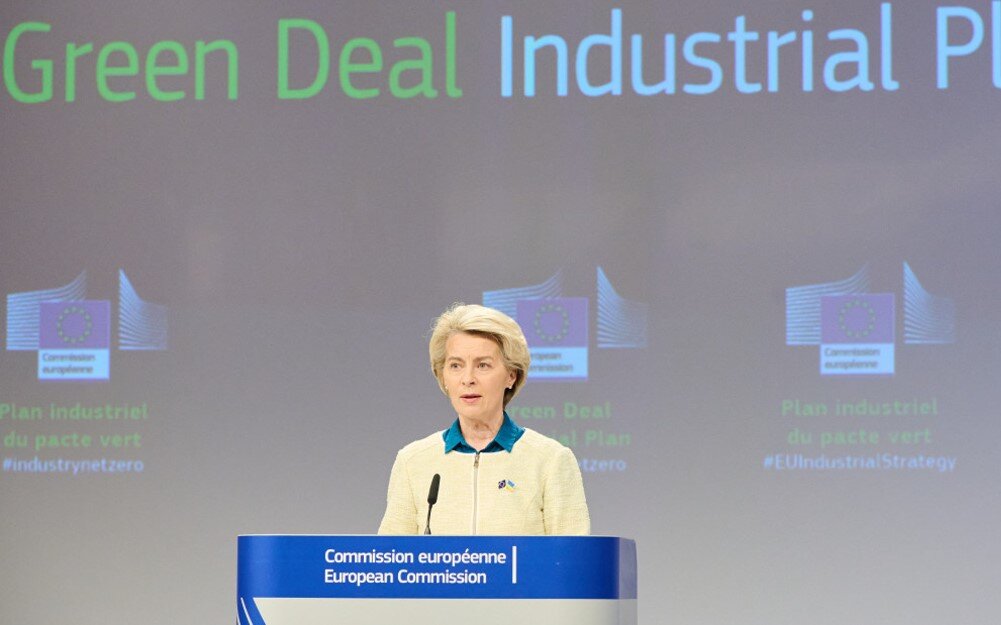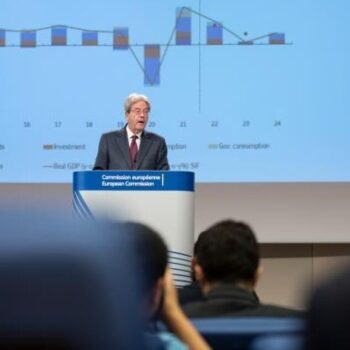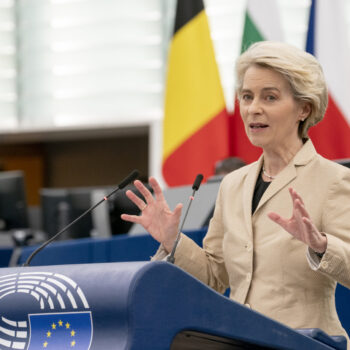March will offer a first glimpse into the green legacy of the current European Commission and Parliament, with important proposals on EU industrial policy for clean tech, internal electricity market design reform, as well as a vote on buildings decarbonisation.
EU energy ministers will particularly be in the spotlight, with negotiations on new renewables and efficiency policies coming to a close and some countries still trying to hold back the ambition of the energy transition.
Member states will be dealing with political and vested interest fractures among them, with nuclear and fiscal orthodoxy at the forefront.
March – a defining moment for EU leaders’ legacy
The vision for a European Green Deal has remained firmly embedded in the EU narrative at home and abroad in the past years. It has been both propelled and put to the test by the Covid-19 pandemic, the war in Ukraine, and subsequent energy and cost of living crises.
Despite significant progress in developing a regulatory framework to drive deep decarbonisation and reshape EU diplomacy accordingly, European policymakers still have a busy year and tough political decisions ahead of them. Each of them will shape the strength and robustness of the framework and directly impact European and global climate action. March will offer a first glimpse into the green legacy of the current European Commission and Parliament.

Emerging political dynamics
- The French government has launched a pro-nuclear offensive to get low-carbon hydrogen recognised as clean energy and counted towards renewables targets. They are defending this position in processes ranging from EU foreign affairs to energy policy and ambition, leading to key decisions being delayed or watered down. The French government is also formalising cooperation with 10 other pro-nuclear member states.
- The German government is opposed to reforming the EU’s economic governance in a way which would allow governments to unlock the necessary investments and spending to face the current challenges. They are also apprehensive to more joint borrowing or new EU funds to allow less wealthy EU countries to respond to the US IRA. This risks alienating countries across Europe by delaying European reform while progressing on its own domestic agenda.
- Manfred Weber, president of the EPP group in the European Parliament, is playing with fire lately. As the S&D group struggles to come through the Qatargate scandal, Weber seems to be increasingly flirting with other right-wing groups, to the point of openly challenging initiatives of their own Commission President, Ursula Von Der Leyen, like the Green Deal Industrial Plan. National interests are also prevailing on the EPP’s traditional stances by recently opposing to the ban of the combustion engine.
Elisa Giannelli, E3G Senior Policy Advisor, EU politics, comments:
“Despite elections approaching fast, this Commission has not run out of political capital yet. However, its legacy doesn’t only depend on its own willingness to act, but also on whether European and national leaders will lend their support. If EU unity crumbles one year before the European elections, ending on a positive note will be much more challenging for the Von Der Leyen Commission”
More information and commentary:
- Manon Dufour (EN, FR), Head of E3G Brussels Office. manon.dufour@e3g.org, +32 (0) 4777678 01.
- Elisa Giannelli (EN, IT, FR), E3G Senior Policy Advisor, EU politics. elisa.giannelli@e3g.org, +32 (0) 4945848 29.
New proposals and emerging issues in March
Industrial policy for clean tech
The EU will propose two regulatory acts as part of the Green Deal Industrial Plan. The Net Zero Industry Act aims to accelerate and protect the growth of Europe’s green industries by establishing clean technology manufacturing goals and speeding up permitting. However, there are concerns about the scope of what will be considered as “net zero industries” and the conditions for receiving public support. The Critical Raw Material Act aims to secure materials necessary for the transition but risks being seen as extractivist instead of creating local value and circularity at home and abroad.
“The Commission’s legacy depends on ambitious NZI and CRM Acts. The first needs to come with green conditionalities and incentivise an accelerated deployment of clean technologies. The second should promote reuse and recycling, ensure sustainable and responsible sourcing, while pursuing cooperation with partner countries to support nascent green industries abroad”, Domien Vangenechten.
Key date: 16 March – Release of the European Commission’s proposals (initially planned for 14 March).
More information and commentary: Domien Vangenechten (EN, NL), E3G Senior Policy Advisor, Industrial Decarbonisation. domien.vangenechten@e3g.org, +32 (0)474871827.
Electricity market design
High energy prices have driven EU political leaders to reconsider the design of the electricity market. The Commission proposals for reforming it aim to get Europe’s system ready for very high levels of renewables and the rapid electrification of other sectors expected by mid-2030s. At stake will be whether the market design can maintain strong incentives for the renewables industry to continue investing into new capacities, and allow consumers to benefit from cheaper renewables coming online.
Key date: 14 March – Commission proposals (initially planned for 16 March).
E3G reaction: Reform of EU’s power market, buildings efficiency and fiscal rules – E3G reacts
More information and commentary: Pieter de Pous (EN, DE, NL), E3G Programme Leader – Fossil fuel transition. pieter.depous@e3g.org, +49 1606573414.
Preparations for next winter
Energy ministers are starting to focus on preparing for the next winter. Despite recent progress in reducing gas consumption by 19%, the discussion in the informal EU Energy Council in February revolved primarily around diversifying fossil gas supply, rather than tackling structural gas demand reduction. A new proposal for gas reduction targets may be proposed before the next EU Energy Council in March, which would indicate more concerted preparation to avoid a fossil gas supply shortfall next winter.
Key date: 28 March – EU Energy Council.
More information and commentary: Rheanna Johnston (EN, DE), E3G Policy Advisor, Energy Transition. rheanna.johnston@e3g.org, +32 (0)492978250.
Decisive steps in negotiations in March
Buildings decarbonisation
The upcoming position of the European Parliament on the Energy Performance of Buildings Directive will likely be transformational for the real economy. The introduction of Minimum Energy Performance Standards has the potential to unleash an ambitious Renovation Wave in Europe. However, some provisions may limit energy savings, especially if fossil fuel phase-out for residential heating is delayed.
“Europe won’t unleash the Renovation Wave it needs without setting a clear direction of travel. Market actors need the right signals to invest in future renovation capacity, and this will only happen with Minimum Energy Performance Standards and a clear fossil fuel phase-out in the EPBD”, Adeline Rochet.
Key date: 14 March – Vote in the European Parliament plenary session.
E3G reaction: Reform of EU’s power market, buildings efficiency and fiscal rules – E3G reacts
More information and commentary: Adeline Rochet (EN, FR), E3G Senior Policy Advisor, buildings decarbonisation. adeline.rochet@e3g.org, +32 (0) 32 470 118 580.
Review of the EU’s fiscal framework
The European Commission has proposed a review of the EU’s economic governance. The timing is crucial, as the current crisis-related suspension of budgetary rules for member states is ending and a return to the old rules would be problematic. For instance, it would further limit the public investment space that is needed for the green transition. Member states have so far been divided in their responses to the Commission’s Communication, but ministers of economy and finance will try to reach more consensus in March, creating momentum for its discussion at the next EUCO.
Key date: 14 March – ECOFIN: potential agreement on council conclusions. 23-24 March – EUCO: discussion on the fiscal framework review.
E3G reaction to the ECOFIN agreement: Reform of EU’s power market, buildings efficiency and fiscal rules – E3G reacts
More information and commentary: Taube Van Melkebeke (EN, NL, FR), E3G Policy Advisor, EU Politics and Climate Governance. taube.vanmelkebeke@e3g.org, +32 (0)472818429.
Gas package and EU green hydrogen framework (possibly)
In March, energy ministers will agree on their common position on the gas package and the speed for deploying decarbonised gas – crucial for the EU’s framework for future gas consumption and European security. At the moment, the gas package does not reflect the urgency of the energy crisis and would not prepare the EU for its upcoming reduction of gas use. Ministers’ decisions to support the independence of the European Network of Network Operators of Hydrogen (ENNOH), strengthen the role of integrated planning, and prioritise the use of hydrogen in hard-to-electrify sectors, could support Europe’s security and sustainability
Key date: 28 March – General Approach on the gas package at Energy Council.
More information and commentary: Raphael Hanoteaux (EN, FR, ES), E3G Senior Policy Advisor, Gas Politics. raphael.hanoteaux@e3g.org, +32 (0)496205903.
Final decisions in March
2030 EU clean energy ambition
A disagreement between countries supporting, as the Commission and the Parliament, a 45% target for renewables in 2030 and those wanting a strong role for nuclear is complicating the trilogues of the Renewable Energy Directive. However, any target below 45% would act as a brake to current renewables growth rates. Moreover, member states are reluctant to mirror the REPowerEU ambition in the Energy Efficiency Directive and pushing even harder against strong governance for an energy savings target, which would not allow sustaining last year’s spectacular drop in energy consumption.
“Agreeing to 45% renewables by 2030 is a critical step to maintaining last year’s momentum behind record growth rates in wind and solar capacities, critical to energy security and keeping energy prices lower”, Pieter de Pous.
Key date: 9 March – Last trilogue on the Energy Efficiency Directive (EED). 29 March – Last trilogue on the Renewable Energy Directive (RED).
More information and commentary: Pieter de Pous (EN, DE, NL), E3G Programme Leader, Fossil fuel transition. pieter.depous@e3g.org, +49 1606573414.
EU climate diplomacy conclusions
EU foreign affairs ministers failed to agree on a common position on EU climate diplomacy at February’s EU Foreign Affairs Council, after reluctance from France. This month, Ministers will try to agree on new conclusions, which could create a strong EU mandate and vision for ambitious EU climate foreign policy in 2023 that effectively rallies partners around a faster global transition. With a strong mandate, the EU could use its way in the G7, G20, and France’s summit on a “New Financial Pact” to inject momentum into delivering climate ambition ahead of COP28.
Key date: 20 March – EU Foreign Affairs Council – Possible conclusions
More information and commentary: Steffen Menzel (DE, EN, FR, ES), E3G Programme Lead, EU Climate Diplomacy. steffen.menzel@e3g.org, +49 15151201182.
Notes to editors
- E3G is an independent climate change think tank with a global outlook. We work on the frontier of the climate landscape, tackling the barriers and advancing the solutions to a safe climate. Our goal is to translate climate politics, economics and policies into action. About – E3G
- For further enquiries email press@e3g.org or phone +44 (0)7783 787 863


